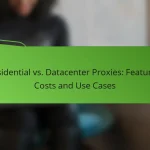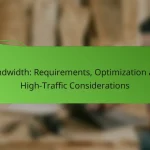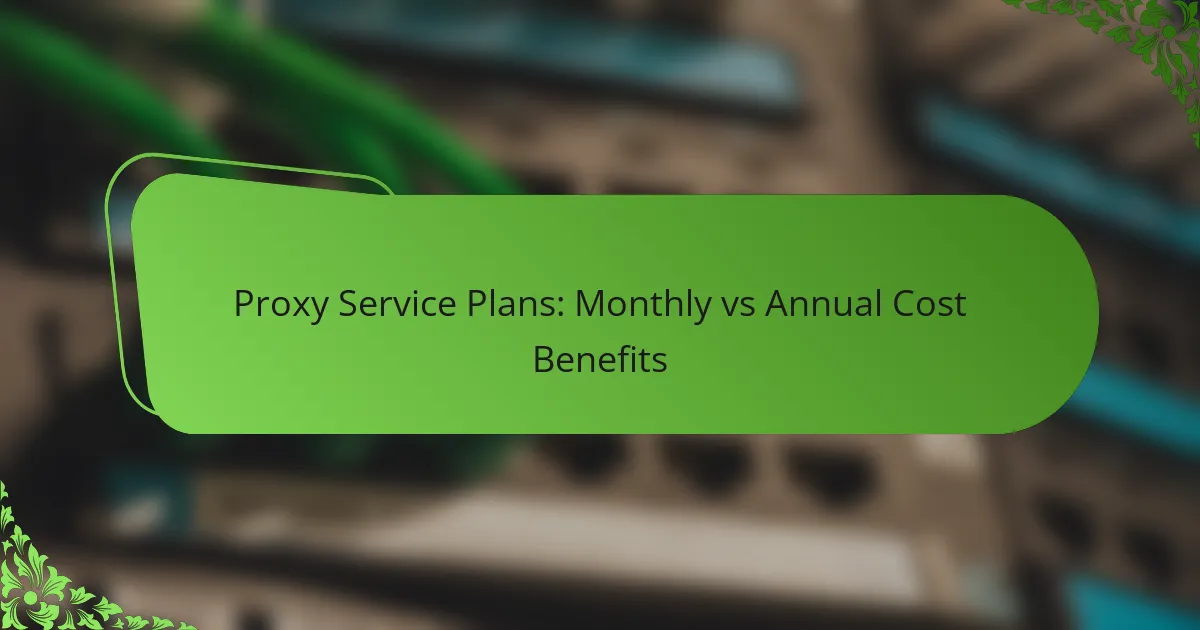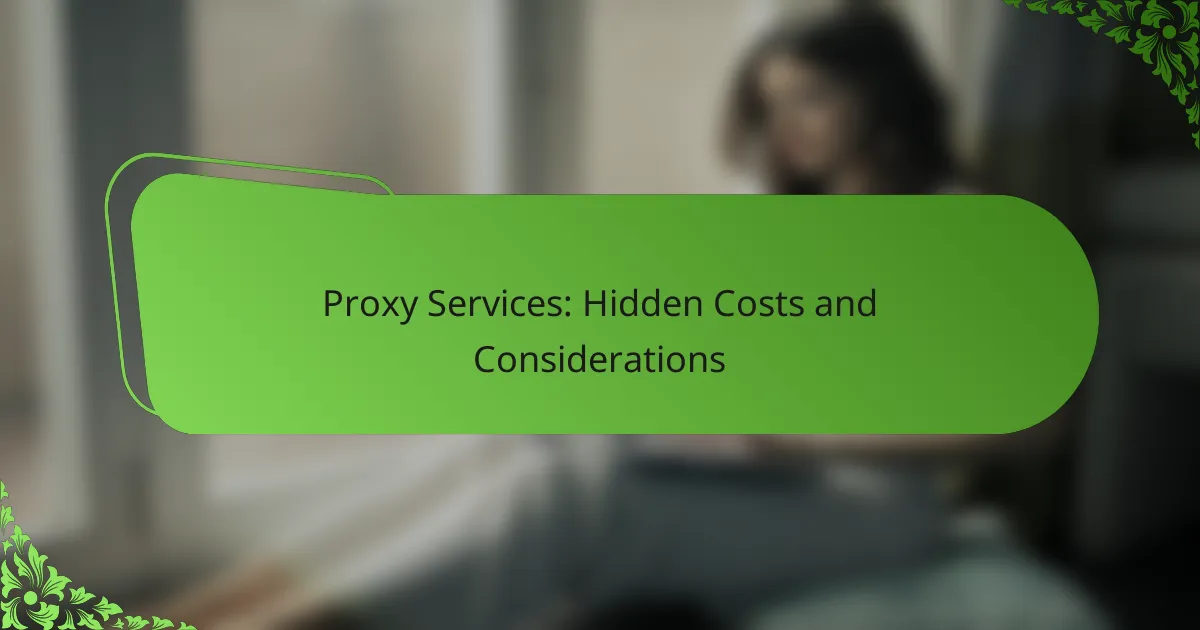When selecting a proxy service, it’s essential to find one that balances performance, reliability, and cost-effectiveness. Leading providers like Bright Data, Smartproxy, and Oxylabs offer various pricing tiers tailored to different usage levels and customer needs. By understanding the factors that influence pricing, such as bandwidth limits and geolocation options, users can make informed decisions to maximize value for their investment.

What are the best proxy services for value in the USA?
The best proxy services for value in the USA offer a balance of performance, reliability, and pricing. Key players include Bright Data, Smartproxy, Oxylabs, GeoSurf, and ProxyRack, each providing unique features that cater to different needs and budgets.
Bright Data
Bright Data, formerly known as Luminati, is renowned for its extensive network and high-quality proxies. It offers residential, data center, and mobile proxies, making it suitable for various use cases such as web scraping and ad verification.
Pricing is tiered based on usage, starting from around $15 per GB, which can add up depending on your needs. Users appreciate the flexibility and the ability to scale as required, but it’s essential to monitor usage to avoid unexpected costs.
Smartproxy
Smartproxy is a cost-effective option that provides access to a large pool of residential IPs. It is particularly popular among small to medium-sized businesses due to its user-friendly interface and straightforward pricing structure.
Plans start at approximately $75 per month for 5 GB of bandwidth, making it accessible for those with moderate proxy needs. Users should consider the limitations on concurrent connections, which can affect performance during peak usage times.
Oxylabs
Oxylabs is known for its premium proxy solutions, offering both residential and data center proxies. It is ideal for enterprises needing high reliability and speed for tasks like market research and data collection.
Pricing is on the higher end, starting around $180 per month for 20 GB, reflecting its robust infrastructure and customer support. Businesses should weigh the cost against their specific requirements to determine if the investment is justified.
GeoSurf
GeoSurf provides a unique approach with its geo-targeted proxies, allowing users to access content from specific locations. This feature is beneficial for businesses needing localized data for advertising or market analysis.
Plans begin at about $300 per month for 38 countries, which may seem steep but is justified by the quality and range of services offered. Users should assess their geographic needs to ensure they choose the right plan.
ProxyRack
ProxyRack offers a diverse range of proxy services, including residential and data center options. Its pricing is competitive, making it a suitable choice for budget-conscious users who still require reliable performance.
Starting at around $50 per month for 10 GB, ProxyRack provides flexibility with its pay-as-you-go model. Users should be aware of potential limitations on speed and availability during peak times, which can impact overall effectiveness.
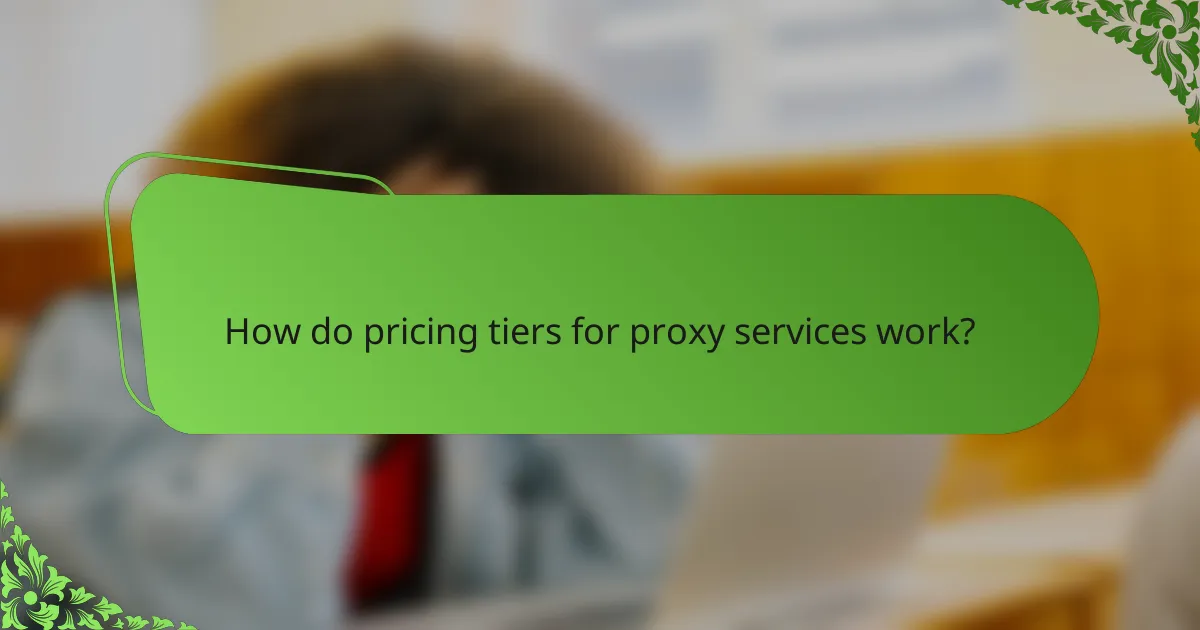
How do pricing tiers for proxy services work?
Pricing tiers for proxy services typically categorize offerings based on usage levels, features, and customer needs. Understanding these tiers helps users choose the most cost-effective option that aligns with their specific requirements.
Monthly subscriptions
Monthly subscriptions are a common pricing model for proxy services, where users pay a fixed fee each month for access to a set number of proxies and features. This model is ideal for businesses with consistent needs, as it provides predictable costs and often includes additional benefits like customer support and service upgrades.
Prices for monthly subscriptions can vary widely, generally ranging from around $10 to several hundred dollars, depending on the number of proxies and the level of service. Users should assess their monthly usage to determine if a subscription is more economical than other models.
Pay-as-you-go models
Pay-as-you-go models allow users to pay only for the proxy services they actually use, making this option flexible and cost-effective for those with fluctuating needs. This model is particularly beneficial for occasional users or businesses that require proxies for specific projects.
Pricing typically involves a per-request or per-GB charge, which can range from a few cents to several dollars, depending on the provider and the type of proxy. Users should carefully estimate their usage to avoid unexpected costs, as high-volume requests can add up quickly.
Enterprise pricing
Enterprise pricing is tailored for large organizations that require extensive proxy services, often involving customized solutions to meet specific operational needs. This model usually includes dedicated account management, enhanced security features, and higher bandwidth limits.
Costs for enterprise pricing can vary significantly based on the scale of usage and required features, often starting in the low hundreds and extending into the thousands of dollars per month. Companies should engage with providers to negotiate terms that best fit their operational scale and budget constraints.
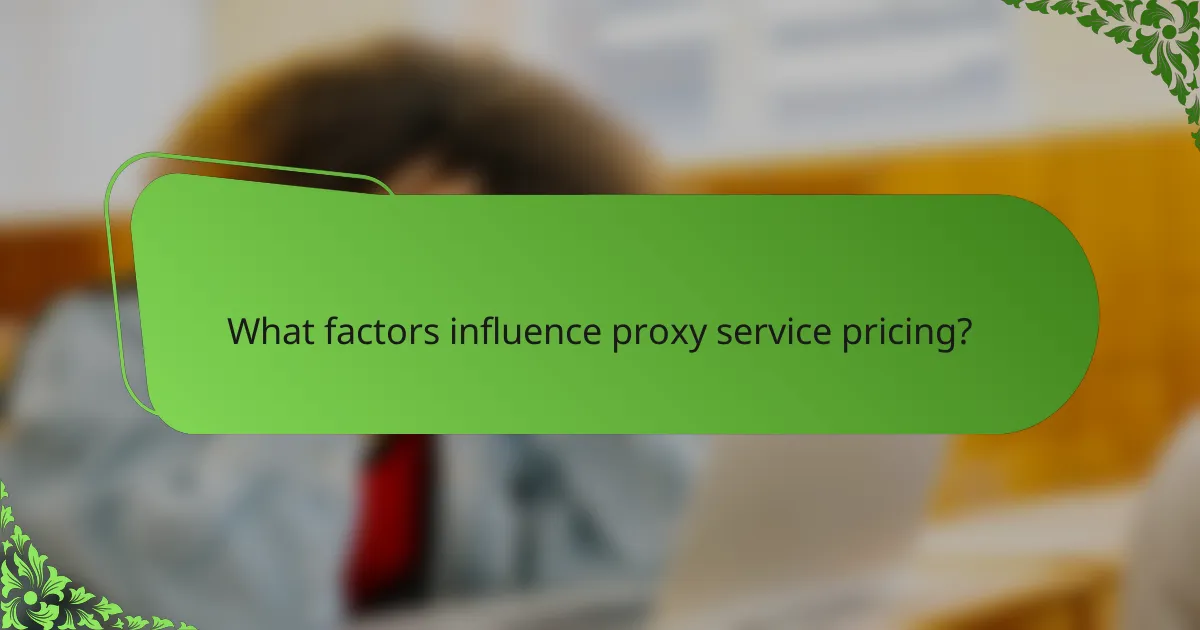
What factors influence proxy service pricing?
Proxy service pricing is influenced by several key factors, including bandwidth limits, geolocation options, the number of IP addresses, and support levels. Understanding these elements can help you choose a service that offers the best value for your specific needs.
Bandwidth limits
Bandwidth limits determine how much data you can transfer through the proxy service over a given period. Services may offer unlimited bandwidth or impose caps, which can significantly affect pricing. For instance, plans with unlimited bandwidth tend to be more expensive but are ideal for high-volume users.
When selecting a proxy service, consider your data needs. If you plan to stream videos or perform large downloads, opt for a plan with higher bandwidth limits to avoid throttling or additional charges.
Geolocation options
Geolocation options refer to the locations from which you can access proxy servers. Services that provide a wider range of geolocations typically charge more, as they offer greater flexibility for bypassing regional restrictions. For example, a service with servers in multiple countries may be priced higher than one with limited locations.
Evaluate your requirements based on the regions you need to access. If you only need proxies from a few specific countries, a more affordable plan with limited geolocation options may suffice.
Number of IP addresses
The number of IP addresses available with a proxy service can influence its cost. Services that offer a larger pool of IPs generally provide better anonymity and less risk of IP bans, which can justify a higher price. For example, plans with hundreds of IP addresses are often more expensive than those with just a few.
Consider how many unique IP addresses you need for your activities. If you require multiple IPs for tasks like web scraping or managing multiple accounts, investing in a plan with a higher number of IPs is advisable.
Support levels
Support levels vary among proxy services and can impact pricing. Higher-tier plans often include 24/7 customer support, dedicated account managers, or faster response times, which can be crucial for businesses relying on proxies. In contrast, budget plans may offer limited support during specific hours.
Assess the importance of support for your operations. If you anticipate needing assistance frequently, choosing a plan with robust support options may save you time and frustration in the long run.

How to choose the right proxy service for your needs?
Choosing the right proxy service involves understanding your specific requirements and evaluating various options based on features, support, and pricing. A well-suited proxy can enhance your online activities, whether for web scraping, anonymity, or accessing geo-restricted content.
Assess your use case
Start by identifying what you need the proxy service for. Common use cases include web scraping, bypassing geo-restrictions, or maintaining privacy while browsing. Each use case may require different types of proxies, such as residential, datacenter, or mobile proxies.
For example, if you need to scrape data from websites, a residential proxy might be preferable due to its lower chance of being blocked compared to datacenter proxies. Understanding your primary objectives will help narrow down your options effectively.
Compare features
Different proxy services offer various features that can significantly impact their performance and usability. Key features to consider include IP rotation, speed, bandwidth limits, and the number of concurrent connections allowed.
For instance, if you plan to run multiple tasks simultaneously, look for services that support a high number of concurrent connections. Additionally, consider whether the proxy provider offers dedicated IPs or shared ones, as this can affect your anonymity and speed.
Evaluate customer support
Reliable customer support is crucial when using proxy services, especially if you encounter issues or need assistance. Check if the provider offers multiple support channels, such as live chat, email, or phone support.
Look for reviews or testimonials regarding the responsiveness and helpfulness of the support team. A provider with strong customer support can save you time and frustration, ensuring that any problems are resolved quickly.
Review pricing structures
Pricing for proxy services can vary widely based on features and usage. Some providers offer pay-as-you-go models, while others have monthly subscriptions. Assess your budget and the expected usage to find a plan that offers good value for your needs.
Consider whether the pricing includes features like dedicated IPs or additional bandwidth, as these can affect overall costs. It’s often beneficial to start with a trial or a lower-tier plan to evaluate the service before committing to a more expensive option.
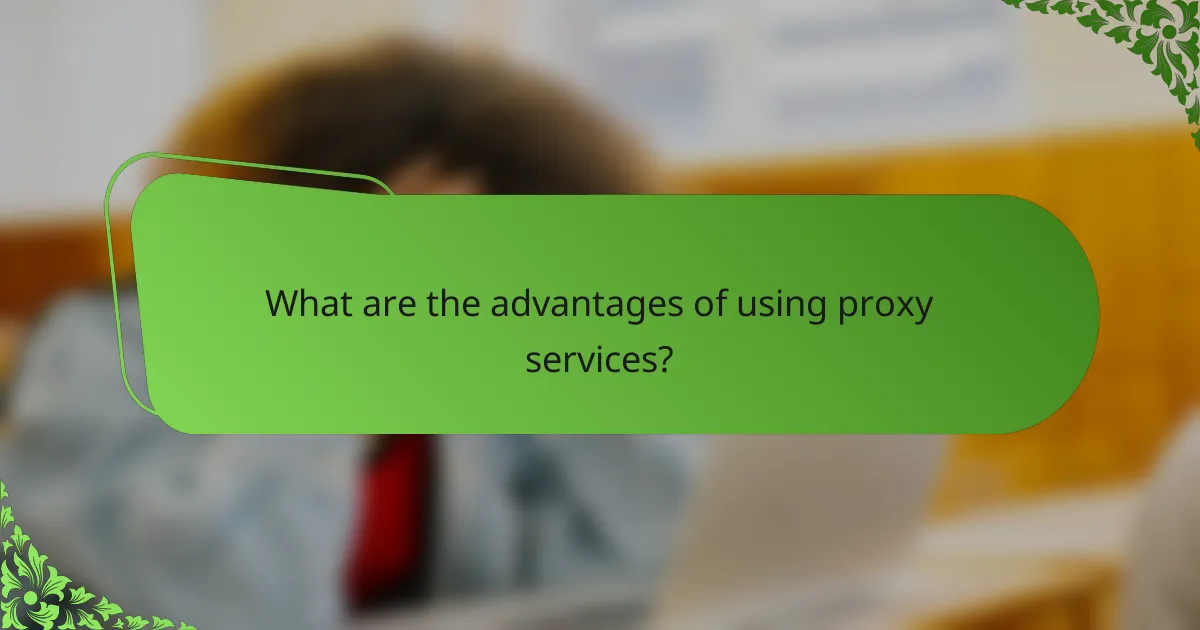
What are the advantages of using proxy services?
Proxy services offer several advantages, including enhanced online privacy and the ability to access geo-restricted content. By routing your internet traffic through a proxy server, you can mask your IP address and bypass regional restrictions on websites and services.
Improved online privacy
Using proxy services significantly enhances your online privacy by hiding your real IP address from websites and online trackers. This makes it more difficult for third parties to monitor your browsing habits and collect personal data.
When selecting a proxy service, consider options that offer strong encryption protocols. Look for providers that do not log user activity, as this can further protect your privacy. A reputable proxy can help you maintain anonymity while browsing or engaging in sensitive online activities.
Access to geo-restricted content
Proxy services allow users to bypass geo-restrictions imposed by websites and streaming platforms. By connecting to a server in a different country, you can access content that may be unavailable in your region.
For example, if you want to watch a show on a streaming service that is only available in the US, using a US-based proxy can grant you access. However, be aware that some platforms actively block known proxy IP addresses, so choosing a reliable provider is essential for consistent access.
